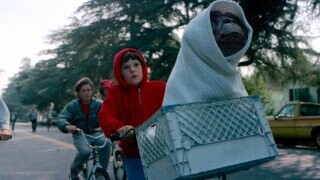Steven Spielberg's Decades-Long History Of Hating Home Viewers

Remember how back in 2019, some people's biggest concerns in the world had to do with streaming services being awarded golden statuettes? Following the 10 Oscar nominations and three wins for Alfonso Cuarón's Roma, a Netflix-produced film with a limited theatrical release, Steven Spielberg reportedly pressured the Academy to ban streaming platforms from awards contention, lest someone accidentally nominate an episode of Floor is Lava for Best Picture, thus ruining the art of cinema forever.
Well, now Spielberg has seemingly changed his tune (presumably composed by John Williams) since it was just announced that Spielberg's company, Amblin Entertainment, has struck a deal with Netflix to produce "multiple films a year" for the streamer. But this isn't the first time the legendary director has fought advances in movie distribution technology, only to eventually capitulate.
In 1988, six years after its release, E.T. the Extra-Terrestrial was still the highest-grossing movie of all time. And despite the fact that the home video boom was in full swing, E.T. wasn't available on VHS or even Betamax, for that matter. Why? Well, because its director was against the idea. Despite his objections, according to Spielberg, there was a "war" of pressure mounting for him to release the movie on cassette. It could be that Spielberg was, like with Netflix, concerned about preserving the sanctity of the cinematic experience, not to mention avoiding pirating.
Don't Miss
Then again, it could just have been that Spielberg was still intent on making more dough by re-releasing the film theatrically. In addition to the '82 run, Universal had brought E.T. back in 1985, and it was considered "a major summer release" since the film wasn't on video, nor did it play on cable, making its return a "can't miss proposition." The re-release made over $40 million at the box office in 1985 and ranked 17th in the year overall; not bad for a three-year-old movie.
Spielberg finally relented and allowed the movie to be released on VHS with the caveat that Universal would withdraw the sale of tapes after 6 to 8 months in order to "protect the value" of potential future re-releases. And in order to keep the price low enough to dissuade piracy, E.T. got some help from his real best friend: selling out to corporations. A tie-in with Pepsi lowered the price of the tape to under $20 and also gave us commercials in which E.T. hangs around some kid who definitely isn't Elliott but who chugged a can of Pepsi right before bedtime like a total goddamn maniac.
Between this and all the Reese's, maybe E.T. should phone home for some vegetables.
You (yes, you) should follow JM on Twitter! And check out the podcast Rewatchability.
Top Image: Universal